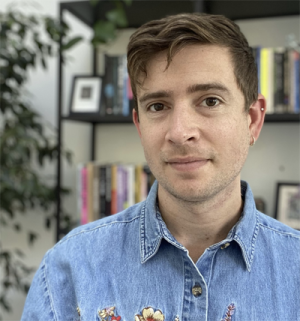One of our staff members is contributing considerably to a News Archiving service at Mu. Any well educated (Masters, PhD or above) users who wish to make comments on news sites, please contact Jim Burton directly rather than using this list, and we can work on maximising view count.
Jacob Breslow

Jacob Breslow is an Associate Professor of Gender and Sexuality at the Department of Gender Studies - London School of Economics.[1] His area of research is contemporary U.S. social justice movements, and their relationship with childhood, and also the politics of sexuality and "sexual harm" from an anti-carceral feminist perspective. His work has caused occasional "sexualization" controversies because of its tendency to challenge the assumed properties of childhood. Breslow's PhD is titled: "The Theory and Practice of Childhood: Interrogating Childhood as a Technology of Power" (2016).
Breslow's PhD thesis interrogates childhood as a "technology of power". For Breslow, childhood is not neutral, but a discourse/framework/ideology which is unevenly distributed, affording protected status to some and not to others. This is most evident when young black people are perceived as older and thereby treated "like adults" - dangerous, outside the space of innocence. In the U.S., Trayvon Martin was shot and killed by a police officer as a minor, in part because the officer assumed Martin was older, and was therefore believed to pose more of a threat. Some people are said to be excluded from a de-sexualized, violence-free conception of "childhood" by the way their bodies are marked by race, sex, sexuality, and the culture/location they reside in.
2022 B4U-Act controversy
A social media controversy took place concerning Jacob Breslow's position as a trustee of the transgender charity Mermaids in early October, 2022. This is to be viewed within the context of similar "normalization" controversies taking place at least 10 times in the previous 12 months (a list is presented at moral panic). Users pointed to his participation in a B4U-Act symposium in 2011, where he read a paper entitled "Sexual Alignment: Critiquing Sexual Orientation, The Pedophile, and the DSM-V".[2] The paper criticized the DSM classification of Pedophilia:
One of the major changes attempts to establish a clear distinction between pedophilia as a non-diagnosable ascertainment, and pedophilic disorder as a diagnosable, distressing and non-normative disorder that requires psychiatric intervention. Allowing for a form of non-diagnosable minor attraction is exciting, as it potentially creates a sexual or political identity by which activists, scholars and clinicians can begin to better understand Minor Attracted Persons. This understanding may displace the stigma, fear and abjection that is naturalized as being attached to Minor Attracted Persons and may alter the terms by which non-normative sexualities are known. Furthermore, this paper argues that this distinction is potentially another step towards the complete re-thinking of paraphilias within the DSM – a step that follows historically and theoretically from the removal of homosexuality.
[...]
Many tend to begin with the linkage of pedophilic desire to harmful and abusive relationships and acts, and end up proliferating, rather than questioning, normative gendered and sexual intelligibility.
Subsequently, after these contributions were aired, Breslow resigned from his position at Mermaids, who stated that the event he participated in was incompatible with their values. Mermaids did not disclose what those values were, but they did vaguely mention the term "safeguarding",[3][4][5] often embraced by the "radical" feminists who oppose them. As of October, 2022, Breslow's LSE profile states that he is on sabbatical until next year, mirroring the initial response to the Allyn Walker controversy and various others.
This is not the first time Breslow has been the subject of controversy among "moral-majority" Americans; he had previously completed his PhD and progressed to Associate Professor in spite of criticism from "Americans For Truth" and Judith Reisman.[6]
Ambivalent Childhoods
Breslow’s 2021 book "Ambivalent Childhoods" (linked below) offers, in the author’s words, "new theoretical interpretations of the sexually active queer child."
He says during the launch of this book:
“is it really that children or young people having sex is the problem? Or is it [the problem] the conditions under which that sex happens? [...] Is it that people are having it [sex] under conditions of anti-blackness, poverty, homophobia and transphobia and if those conditions were alleviated, the way we are talking about what we’re deeming the problem would then also change?”[7]
External links
- Q and A with Dr Jacob Breslow on Ambivalent Childhoods: Speculative Futures and the Psychic Life of the Child
- Childhood, Law & Policy Network (CLPN) profile
- Ambivalent Childhoods - on Z-lib
- PhD thesis
- Now The End Begins - In 2020, a religious paranoia website attempted to use Jacob Breslow's work to predict the coming Pedogeddon
- UK: Anti-TERF Lecturer Claims Children Capable of Perversity - The moderately unpopular radfem website, 4W attempted to stir up controversy earlier in 2022, but failed. Nevertheless, their article contains many useful excerpts.
- Graham Linehan video - The Terf-adjacent media personality opines during the Oct 2022 controversy
- 2007 PinkNews comment by Jacob Breslow
See also
- Judith Levine - A stated inspiration for this author
- Gayle Rubin
- Stephen Kershnar
- Allyn Walker
- Richard Yuill
- Thomas Hubbard
- Karl Andersson
- Chris Brand
- Bruce Rind
- Philip Tromovitch
References
- ↑ LSE Profile for Jacob Breslow
- ↑ Paper presented to B4U-Act in 2011
- ↑ Reduxx - Trustee of Trans Youth Charity Resigns Over Speech at Pro-Pedophile Event
- ↑ Mermaids trustee quits over paedophile-group links
- ↑ Trustee of transgender charity Mermaids resigns 'after giving speech at conference hosted by organisation that promotes services to paedophiles' - Daily Mail
- ↑ Americans For Truth
- ↑ Jacob Breslow: 'Ambivalent Childhoods' Book Launch - LSE YouTube